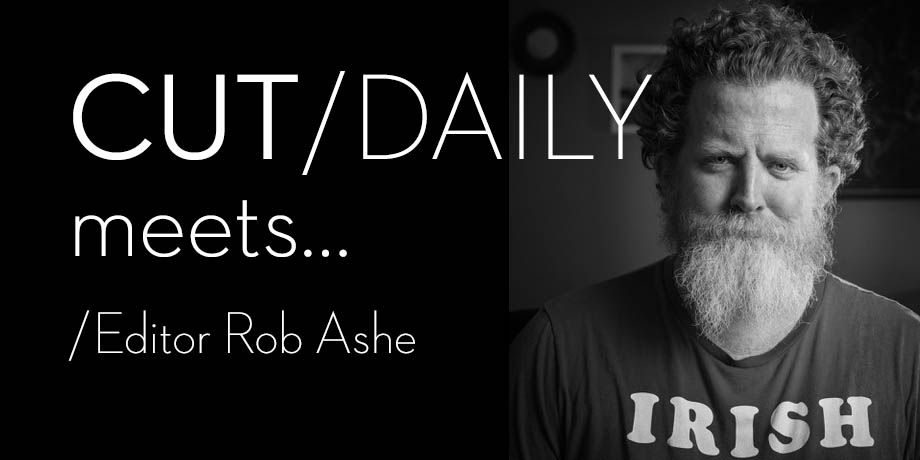#040 - Cut/Daily Meets... Conan Editor Rob Ashe

Welcome to the first in a series of micro interviews with Post-Production professionals from across the industry. I hope you will find them thought-provoking, informative and inspiring!
Today Cut/daily meets editor Rob Ashe who has (among other things!) been the lead editor of Conan for the past 11 years, deftly meeting the demanding schedule of getting funny content on the air four nights a week.
I'm very grateful to Rob for his openness and honesty and the hard-won wisdom he shares in this interview.
Given his day job, my bonus question to Rob was:
What do you think editors who cut comedy can teach other editors who haven't?
Hmm. Bottom line is it’s all about the joke. Often I will find the punch line or payoff of a joke and work backwards to deconstruct it.
It allows you to question what you absolutely need to pay a joke off.
The words become very important because if they can’t hear the joke they won’t laugh.
There’s a rhythm to editing comedy that’s very hard to put into words. It’s what I enjoy about it the most.
What’s your daily work routine?
For the past year as we’ve been all delivering our show from home, I wake up with the kiddos at 6am and get them ready for school.
After dropping them off at 8:45, I begin the work day by answering emails and assessing if we have all the graphics, SFX, and media for any segments I am working on that day.
I edit whatever segments I am assigned and upload them to Frame.io for review. Once the show begins taping from the Largo theater, I am in show mode.
I am usually in charge of editing Act 1, which is the comedy of that day’s show.
I will either upload drafts of an act to frame.io for review or work live with our head writer via Evercast to get the act complete and to time.
Once the show is fed to Atlanta via Warner Bros to Atlanta, I compile the show project and set it to archive.
My night completes when our show is on the air at 8pm Pacific.
What do you now know about your work that you wish you’d known when you first started?
Conan said to me around 11 years ago: "This is a marathon and not a sprint."
There’s always another day to get something done, to nail the next version etc. Not everything hangs on you working until 2am under diminishing returns.
Go home. See your family. Get some sleep. You’ll get it done tomorrow.
Don’t be lazy and leave early just don’t sacrifice your health.
I think I’ve only now just begin to understand this.
What did your hardest professional failure teach you?
It was the first time I edited something that was going to be shown in a movie theater.
It was a short film that I was very proud of that had a mix of comedy and horror that was narrated.
What I didn’t know, due to the speakers and headphones I used, was there was a terrible low rumble every time the narrator spoke. The rumble practically shook the speakers in the theater and the audience covered their ears.
It taught me to buy the good headphones and to get my hearing checked yearly. Ugh.
Rob and the other editors feature in this hilarious segment about Apple's ill-fated FCPX launch back in 2011.
What is the number one thing that helped you shorten your craft’s learning curve?
I think one of the things that makes me different from a lot of editors is that I read a script, get a POV, and try to execute that POV on a timeline immediately. I don’t overthink (I call it fishing) while I edit and I’m willing to be very wrong.
Many editors worry so much about getting it right that first time. I just think that you truly can’t evaluate a scene or a segment until you see how the whole piece flows on a timeline.
It’s a jigsaw puzzle and every piece is as important as the other. And there’s always another version.
Which book has helped you most in your career?
Not Even Wrong: A Father's Journey into the Lost History of Autism by Paul Collins.
I am a father to three kiddos with orthopaedic challenges. My oldest is also non-verbal. She has never received an autism diagnosis but I really wanted to read a book from a father’s POV going through a similar journey. It helped me in a time I was looking for guidance.
I love the quote:
The problem with pounding a square peg into a round hole is not that the hammering is hard work.
It's that you're destroying the peg.
It helped open my mind about what the future could hold for my daughter and it also helped me professionally as an editor.
Why try to hammer something so hard when it doesn’t fit?
And your final words of wisdom?
Please remember that all of this is fun.
It’s supposed to be fun.
Get more sleep.
